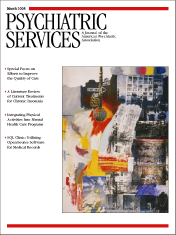Psychologist Prescribing
To the Editor: Certain pernicious myths have clouded our perceptions and befuddled our response to the American Psychological Association's campaign to establish independent medical practice for psychologists. Allow me to debunk.
Myth 1: It's about prescription privileges. "Prescription privileges" is the term clever psychologists have given to their quest for independent medical practice authority. Clever psychiatrists will not perpetuate this deception but rather use the more appropriate term "independent medical practice authority." The proposed legislation would grant authority to the Board of Psychology to create standards and issue licenses for psychologists to perform medical evaluations and provide medical treatments for mental illness and all other disorders within the scope of practice of psychology.
Myth 2: We are fighting the psychologists. We have no quarrel with psychologists. They may wish to have the license we have, and perhaps the skills, but we have no authority to grant their wish. It is no use for them to argue with us, and no use for us to argue with them. It is the state legislature that has authority to grant such wishes. Psychologists have wisely taken their argument directly to legislatures. Here is their argument: A fundamental medical education is not required for the medical evaluation and medical treatment of human brains in human beings—at least, for starters, not in rural and other underserved areas. Therefore, citizens of our state will be well served—even better served—by the creation of a new, independent medical discipline regulated by the Board of Psychology.
Myth 3: Only a vocal minority of psychologists want medical practice authority. The first medical practice bill was introduced in Hawaii in 1985. Similar bills have been introduced in many states over the past 18 years, with increasing support from the national organization. Four bills have come to California, and rumor is the next will come in 2005. The American Psychological Association adopted, by vocal majority, "prescriptive authority" as national policy and priority in 1995. A majority of psychologists have put their weight behind this campaign.
Myth 4: It still doesn't matter because only a vocal minority of psychologists would make the midcareer effort required to get the license. It is likely true that only a minority of current psychologists would seek medical practice authority, but that is hardly the point. What matters is the future. This legislation would institutionalize separate and second-class medical care for people with mental illness. The less expensive, less adequate track to independent medical practice would soon dominate markets in which short-term cost savings are more important than quality and long-term benefits. Think about how the market works.
Myth 5: Psychiatrists are divided on the issue. None of us believe it would be good public policy to fragment the standards and the regulation of the practice of medicine, to license people for independent medical practice without a fundamental medical education, or to reduce the standard of care for the mentally ill. These are the issues, and we are not divided on them.
If we do not join in the making of policy, we will live with policy made by others. We must put our unanimous weight behind our beliefs, our profession, and our commitment to the people we serve.
Dr. Thurston, who is in private practice in Ventura, California, is chair of the California Psychiatric Political Action Committee.



